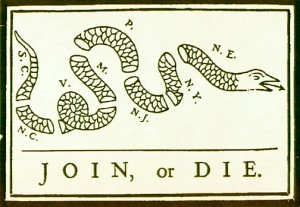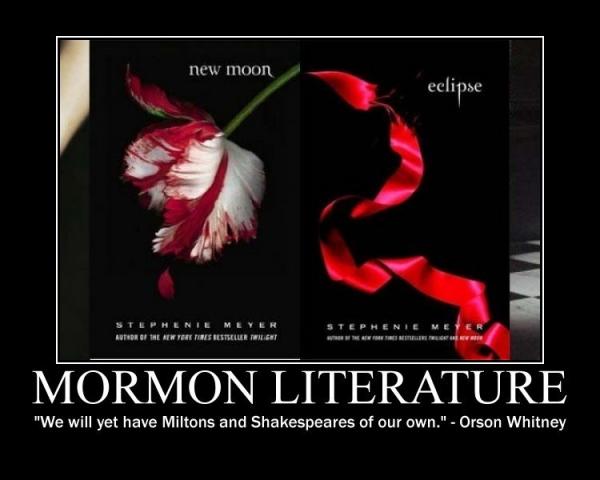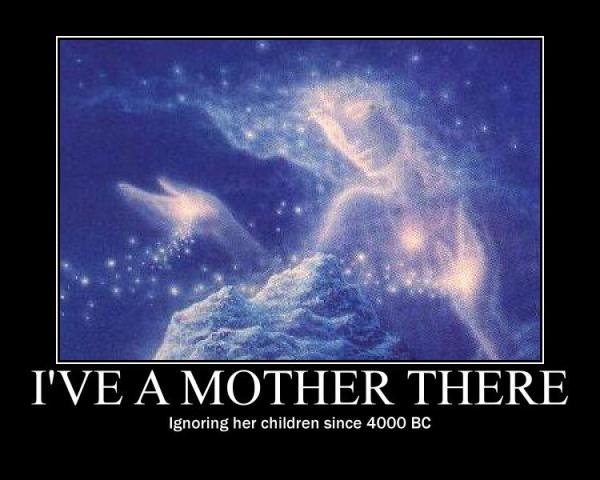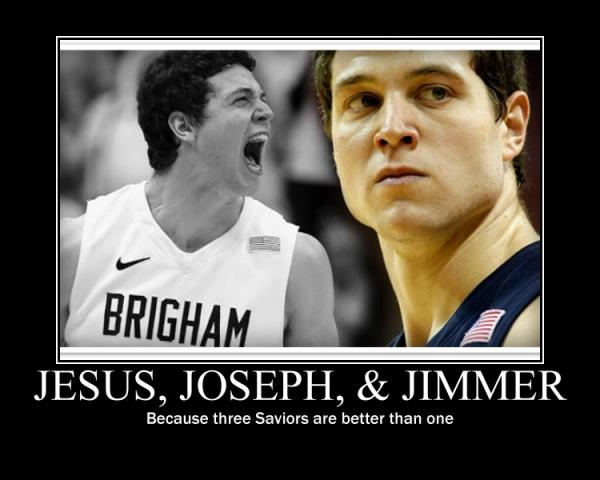 We can blame it all on Ben Franklin. Starting the trend for using artistic satire to editorialize, his “Join, or Die” cartoon was the first of its kind to be published. Depicting the original American colonies as pieces of a snake, he attempts to illustrate the importance of unity to their goals.
We can blame it all on Ben Franklin. Starting the trend for using artistic satire to editorialize, his “Join, or Die” cartoon was the first of its kind to be published. Depicting the original American colonies as pieces of a snake, he attempts to illustrate the importance of unity to their goals.
Since then, editorial cartoons have been used to criticize politicians, corporations, movements and even churches. It seems that there are no limits to satire: from rape scenes to racism to mocking the sacred. And the LDS faith has not been immune. From Pulitzer Prize winning former Mormon Steve Benson to “retired Mormon” Pat Bagley, shots have been taken at Mormon culture and leaders.
But what used to limit this expression was artistic ability. You at least had to be able to draw to pull off an editorial cartoon. With modern technology, that is no longer the case.
A site called mormongags.com recently came on the scene revisiting satire and the sacred as pictures are coupled with captions to get a laugh and make a point. Its subtext says “edu-taining mankind since the foundation of the world.” Some are funnier than others, using more subtlety in wit or choosing a less sensitive subject. Some leave a bitter aftertaste.
They’ve been accused of being mean-spirited and sacrilegious and they’re getting a lot of laughs and some criticism as they’re shared on Facebook.
In the more mild, there’s a poke at Mormon culture with this one:
;
;
;
;
;
;
;
;
;
;
;
;
;
;
;
;
There’s a reference to the potential inconsistency in Mother of Heaven doctrine:
;
;
;
;
;
;
;
;
;
;
;
;
;
;
;
;
But then they start getting a bit more edgy. Shots comparing the Jimmer phenomenon to Jesus and Joseph Smith and the plight of gays to that of blacks:
;
;
;
;
;
;
;
;
;
;
;
;
;
;
;
;
;
;
;
;
;
;
;
;
;
;
;
;
;
;
;
And then, they start pushing some real boundaries suggesting current LDS projects are greed motivated and criticizing the past mistakes by leaders and questioning their prophetic ability (and these are all from the “Celestial Gallery” said to be “MormonGags so pure in heart, even Grandma might laugh! (Rated G for ‘Golly Gee, that’s clever!’)”
;
;
;
;
;
;
;
;
;
;
;
;
;
;
;
;
I dare say these wouldn’t make my grandmother laugh, and she had quite the sense of humor. Some of them even cause me to wince. Where is the line between comedy and commentary? Are these just Anti-Mormon jabs or could they be compared to an editorial cartoon? Are there lines that should not be crossed in satire?






I have to say, I thought those were mildly hilarious, particularly the gay/black couplet. (Not in a LOL-way but more of a quiet snicker kind of way.) Irreverent sure, but not anti. I can’t help but acknowledge that most of them (including the rest on the site) have valid points.
I once vowed I would never leave Mormonism because then I couldn’t poke fun at it – and there’s a lot to laugh at! (remember the Seinfeld episode when Dentist Watley became Jewish just so he could tell “Jewish jokes?”)
The Sacred Cow is a great way to look at it. In my view, in order for it to truly tickle the funny bone, material has to have some truth in it, yet when it leans bitter the humor dissipates for me. Humor is certainly a relative thing from person to person. I find that these de-motivational messages tell me a lot about where the creator is on their Mormon trail – whether they are truly having fun with the craziness they live with in Mormonism, or whether they are in the midst of a bad, bitter break-up! I tend to laugh at the ones which reflect where I’m at…
I don’t find most of them funny at all. To me, they seem intentionally hurtful — either hurtful toward others who treasure their relationship with the Church or hurtful toward the persons the creators used to be when they themselves treasured their relationship with the Church.
Until a critic can persuade the criticized that s/he truly understands their viewpoint, the critic is indulging in ridicule of one group to a different one. I don’t see much effort at mutual understanding, compassion, or kindness in most of these.
I compared these to an editorial cartoon precisely because I didn’t think they were so funny in and of themselves to be comedy. But rather I think they make a point using satire. It’s not rolling on the floor humor, but the best ones have a wit and a bite to them just like the best political cartoons. It’s a form of expression I appreciate even when I don’t agree with it or think it might be too harsh because through the satire a point is made so clearly that can’t be expressed another way.
For instance, I find the Mother in Heaven an expression of this person’s pain at the knowledge that s/he has a mother in heaven that can’t be called on for mysterious reasons. I sense a feeling of neglect and sorrow.
To me, the black/gay comparison is cutting because of this image and text. It doesn’t seem any more mean-spirited than the position it contradicts.
But I may be jaded. I’m interested in hearing more.
I think Laurie nailed it — “I tend to laugh at the ones which reflect where I’m at. . .” Some I find too biting, some a bit blah, and some just right.
I will say, though, that if I were to run these through Sean’s criteria, most of these probably would fail. But then again, so would just about every editorial cartoon I’ve ever read. I suppose it says more about me than anything else, but any criteria would would sweep away so much just strikes me as far too broad.
Like Mel, I also kinda like the black/gay poster. I just think it works on so many levels.
First, in the church, we generally think of eternal progression as something that happens to individuals, not institutions. This turns that on its head. “Eternal Progression” here refers not to people individually but to the institutional doctrines themselves.
Second, this poster explains about as concisely as one possibly can, why some folks hold out hope for the church to change its position when it comes to gays. If prior thinking on blacks can change, why not the current position on gays.
Third, it plays off Lorenzo Snow’s famous couplet about men becoming gods, a couplet that President Hinckley seemed to back off when asked about it on Larry King. For better or worse, Hinckley’s response seemed intended to downplay this distinctive Mormon doctrine. Is it possible that 10 or 20 years from now, we might see some future church president making the same sort of comments to explain certain statements in The Proclamation on the Family?
Fourth, the picture here puts a live face on the issue. It’s easier to assert in the abstract that gays shouldn’t be allowed to marry or fully participate in the church. But saying it while looking these folks in the face is a little tougher.
Fifth, the combination of the racial issue and the gay issue in the same picture and text strikes me as particularly powerful. I see the analogies between the two as pretty compelling. As their shirts say, gay in the new black.
Moreover, I think all of these points are made pretty harmlessly, without indulging in ridicule. People might not agree with what this poster is saying, but I’m not sure why anyone would take moral offense at it. But then again, that probably says more about me than anything else.
I’ve been thinking about this post and why some of these images make me squirm and, more broadly, where my sweet spot is when it comes to satire. I frequently laugh out loud when I’m watching Jon Stewart, Colbert or Tina Fey, but I cringe when watching South Park and Family Guy. South Park and Family Guy both have a cruder sensibility, but I don’t think it is just poop jokes and physical humor that makes me squirm. Although South Park often makes brilliant points (I find Family Guy fairly nihilistic), there is a ruthlessness, a mean-spiritedness, which isn’t funny for me. (Why, oh why, can’t they be nicer to Butters?) I always feel that Stewart and Fey are ruthless when it comes to bad behavior and ideals, but just as likely to turn the satire on themselves and kinder when it comes to people.
Basic rule of thumb for me is that comedy is at it’s best when the creator is first and foremost trying to be funny.
It’s much less so when the creator is trying to teach/preach/enlighten first and then attempting to wiggle some laughs from it. The folks on the Daily Show may be deemed to have a voice in the system now, but they are first and foremost comedians looking for a laugh, and were smart enough to harvest the low-hanging fruit that is the bulk of this country’s political and media landscape. By contrast, I’ve never found folks like Mr. Deity or Bill Mahr or Michael Moore quite as amusing, as I’ve always gotten the sense that humor is second priority – sometimes a distant one. I see much of the same here.
I find the posters ironic and witty – and they make me sad. I think the Church could have been so much – it’s just so disappointing. I hope to find the place that truly belongs to Jesus.
Keep up the fantastic work, I read few blog posts on this web site and I believe that your web blog is really interesting and contains circles of wonderful information.